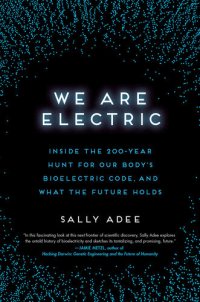
Ebook: We Are Electric: Inside the 200-Year Hunt for Our Body's Bioelectric Code, and What the Future Holds
Author: Sally Adee
- Tags: Science, Sociology, Nonfiction, SCI017000, SCI024000, SOC057000
- Year: 2023
- Publisher: Hachette Books
- Language: English
- epub
Science journalist Sally Adee breaks open the field of bioelectricity—the electric currents that run through our bodies and every living thing—its misunderstood history, and why new discoveries will lead to new ways around antibiotic resistance, cleared arteries, and new ways to combat cancer.
You may be familiar with the idea of our body's biome: the bacterial fauna that populate our gut and can so profoundly affect our health. In We Are Electric we cross into new scientific understanding: discovering your body's electrome.
Every cell in our bodies—bones, skin, nerves, muscle—has a voltage, like a tiny battery. It is the reason our brain can send signals to the rest of our body, how we develop in the womb, and why our body knows to heal itself from injury. When bioelectricity goes awry, illness, deformity, and cancer can result. But if we can control or correct this bioelectricity, the implications for our health are remarkable: an undo switch for cancer that could flip malignant cells back into healthy ones; the ability to regenerate cells, organs, even limbs; to slow aging and so much more. The next scientific frontier might be decrypting the bioelectric code, much the way we did the genetic code.
Yet the field is still emerging from two centuries of skepticism and entanglement with medical quackery, all stemming from an 18th-century scientific war about the nature of electricity between Luigi Galvani (father of bioelectricity, famous for shocking frogs) and Alessandro Volta (inventor of the battery).
In We Are Electric, award-winning science writer Sally Adee takes readers through the thrilling history of bioelectricity and into the future: from the Victorian medical charlatans claiming to use electricity to cure everything from paralysis to diarrhea, to the advances helped along by the giant axons of squids, and finally to the brain implants and electric drugs that await us—and the moral implications therein.
The bioelectric revolution starts here.
You may be familiar with the idea of our body's biome: the bacterial fauna that populate our gut and can so profoundly affect our health. In We Are Electric we cross into new scientific understanding: discovering your body's electrome.
Every cell in our bodies—bones, skin, nerves, muscle—has a voltage, like a tiny battery. It is the reason our brain can send signals to the rest of our body, how we develop in the womb, and why our body knows to heal itself from injury. When bioelectricity goes awry, illness, deformity, and cancer can result. But if we can control or correct this bioelectricity, the implications for our health are remarkable: an undo switch for cancer that could flip malignant cells back into healthy ones; the ability to regenerate cells, organs, even limbs; to slow aging and so much more. The next scientific frontier might be decrypting the bioelectric code, much the way we did the genetic code.
Yet the field is still emerging from two centuries of skepticism and entanglement with medical quackery, all stemming from an 18th-century scientific war about the nature of electricity between Luigi Galvani (father of bioelectricity, famous for shocking frogs) and Alessandro Volta (inventor of the battery).
In We Are Electric, award-winning science writer Sally Adee takes readers through the thrilling history of bioelectricity and into the future: from the Victorian medical charlatans claiming to use electricity to cure everything from paralysis to diarrhea, to the advances helped along by the giant axons of squids, and finally to the brain implants and electric drugs that await us—and the moral implications therein.
The bioelectric revolution starts here.
Download the book We Are Electric: Inside the 200-Year Hunt for Our Body's Bioelectric Code, and What the Future Holds for free or read online
Continue reading on any device:

Last viewed books
Related books
{related-news}
Comments (0)